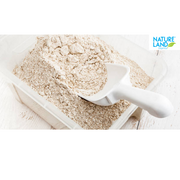
Welcome to our blog, where we knead the facts and sprinkle a little inspiration into your everyday baking routine! Today, we're diving headfirst into the world of organic whole wheat flour – a wholesome ingredient that not only elevates your recipes but also takes your commitment to healthy living up a notch. So grab your mixing bowls and join us as we sift through the benefits, versatility, and remarkable flavor of this nutrient-packed superstar. From scrumptious bread loaves to delectable pastries, get ready to unlock a whole new realm of culinary possibilities with organic whole-wheat flour!
Introduction to Organic Whole Wheat Flour
Organic whole wheat flour has gained popularity in recent years due to its numerous health benefits and superior taste. It is a type of flour made by grinding the entire wheat kernel, including the bran, germ, and endosperm. This makes it different from refined flours which only use the endosperm.
The process of making organic whole wheat flour involves minimal processing, ensuring that all the natural nutrients present in the wheat kernel are retained. This means that it is a healthier alternative to refined white flour, which has undergone heavy processing and lost most of its nutritional value.
One of the main reasons why people choose organic whole wheat flour over other types of flour is because it is rich in fiber. The bran layer contains high amounts of dietary fiber, which aids digestion and helps regulate blood sugar levels. Organic whole wheat flour contains three times more fiber than refined white flour.
Moreover, this type of flour also contains essential vitamins and minerals such as iron, magnesium, phosphorus, and B vitamins. These nutrients play important roles in maintaining overall health and well-being. They help with energy production, bone health, brain function, and immunity.
Another advantage of using organic whole wheat flour is its low glycemic index (GI). This means that it does not cause a rapid spike in blood sugar levels like refined white flour does. As a result, it can help prevent or manage conditions such as diabetes and obesity.
Aside from being nutritious and healthy, organic whole wheat flour also offers a delicious nutty flavor to baked goods. Its slightly coarse texture gives bread and pastries a satisfying chewiness that cannot be achieved with refined flour.
Furthermore, using organic whole wheat flour supports sustainable farming practices. Since it is grown without synthetic pesticides or fertilizers, it promotes soil health and biodiversity while reducing water pollution.
Why Choose Organic Whole Wheat Flour?
Organic whole wheat flour is becoming increasingly popular as more and more people are turning to healthier, natural options for their diets. But with so many different types of flour available on the market, why should you choose organic whole wheat flour? In this section, we will discuss the numerous benefits of choosing this nutritious and versatile flour.
- Nutritional Benefits:
Organic whole wheat flour is packed with essential nutrients vital for maintaining good health. Unlike refined flours, which have been stripped of their nutrients during processing, organic whole wheat flour retains all parts of the grain – the bran, germ, and endosperm. This means it contains higher levels of fiber, protein, vitamins (such as B vitamins), and minerals (such as iron) than its refined counterparts.
- No Harmful Chemicals:
One of the main reasons people choose organic products is to avoid exposure to harmful chemicals such as pesticides and herbicides. Organic farming practices prohibit the use of these toxic substances in growing crops, ensuring that your food is free from any harmful residues. By choosing organic whole wheat flour, you can rest assured that you are not consuming any harmful chemicals.
- Better Taste:
Organic whole wheat flour has a distinct nutty flavor that sets it apart from refined flour. This is because it contains all parts of the grain which gives it a richer taste profile compared to processed flours which often have added preservatives and artificial flavors.
- Versatility in Cooking:
Organic whole wheat flour can be used in a variety of dishes such as breads, cakes, pastries, and even pasta! It provides a denser texture compared to refined white flour but can easily be substituted or mixed with other flour for different baking needs.
- Improved Digestion:
The high fiber content found in organic whole wheat flour helps improve digestion by promoting regular bowel movements and reducing constipation. It also helps regulate blood sugar levels and keeps you feeling full for longer, making it a great option for weight management.
How is Organic Whole Wheat Flour Made?
Organic whole wheat flour is becoming increasingly popular among health-conscious individuals due to its numerous nutritional benefits. It is made from grinding the entire wheat kernel, including the bran, germ, and endosperm. But how exactly is organic whole wheat flour made? In this section, we will delve into the detailed process of making this nutritious and versatile ingredient.
The first step in making organic whole wheat flour is selecting high-quality organic wheat grains. These grains are typically grown without the use of synthetic fertilizers or pesticides, ensuring that the final product is free from harmful chemicals. Farmers also follow strict guidelines to maintain soil fertility and crop rotation to preserve the nutrients in the grain.
Once harvested, the wheat grains are thoroughly cleaned to remove any impurities such as dirt or stones. This process involves passing them through a series of screens and sieves to separate any foreign particles.
After cleaning, the grains are sent through a series of rollers that crush them into smaller pieces called groats. The groats then pass through a sifter that separates them based on size – larger ones for coarse whole wheat flour and smaller ones for fine whole wheat flour.
The next stage involves tempering or conditioning the groats by adding moisture to make them more pliable for milling. This allows for easier separation of bran and germ from the endosperm during grinding.
The tempered groats then go through several rounds of milling where they are ground between sets of steel rollers until they reach the desired fineness. The resulting mixture is passed through sifters once again to separate any remaining bran and germ particles from the finely ground endosperm.
At this point, you have two options – leaving it as-is for unbleached whole wheat flour or further processing it with bleaching agents to produce bleached white whole wheat flour. However, most organic brands opt for unbleached methods as bleaching can strip away valuable nutrients from the flour.
The flour is packaged and ready for consumption. Organic whole wheat flour is highly nutritious and retains all parts of the wheat kernel, making it a rich source of fiber, protein, and essential vitamins and minerals.









